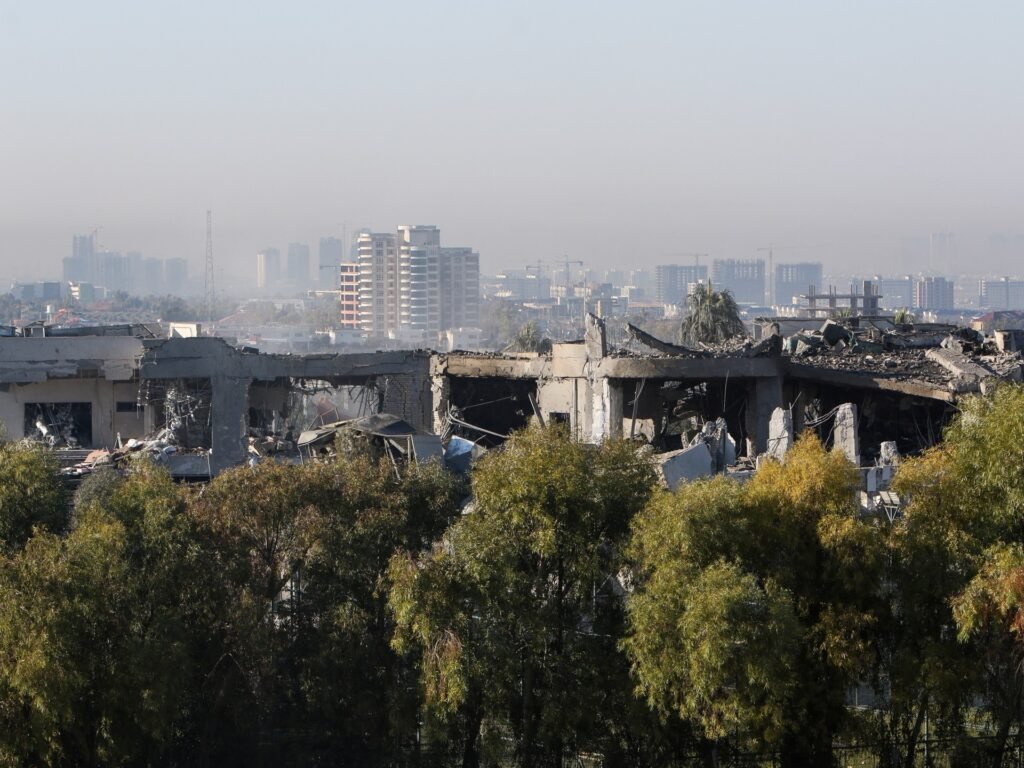Iran’s Islamic Revolutionary Guards Corps (IRGC) fired a ballistic missile at what it claimed was an Israeli “spy headquarters” in Iraq’s Kurdistan region, and the Islamic State of Iraq and the Levant (ISIL or ISIS) militant group in northern Syria. They also attacked targets believed to be associated with the group. .
At least eight explosions were heard early Tuesday morning in Erbil, the capital of Iraq’s semi-autonomous Kurdish region. According to the Regional Safety Council, four people were killed and six others were injured.
“The ballistic missiles were used to destroy espionage centers and gatherings of anti-Iranian terrorist organizations in the region,” the Revolutionary Guards said, according to state media.
The Iraqi government condemned Iran’s “invasion” of Erbil, which resulted in civilian casualties in a residential area, as a violation of the country’s sovereignty and the security of its people, according to a statement from the Ministry of Foreign Affairs.
The government said it would consider various measures, including filing a complaint with the United Nations Security Council.
Iran’s IRNA news agency reported that the Revolutionary Guards claimed to have targeted the headquarters of Israel’s intelligence agency Mossad in Erbil.
A statement from the Revolutionary Guards said: “In response to the Zionist regime’s recent atrocities that led to the killing of SS and Axis of Resistance commanders, one of Mossad’s main spy headquarters in Iraq’s Kurdistan region was destroyed by a ballistic missile. ” he said.
He added: “We assure the people that the Guard’s offensive operations will continue until we avenge the last drop of the blood of our martyrs.”
Iraqi Kurdish Prime Minister Masrour Barzani condemned the attack on Erbil as a “crime against the Kurdish people.”
Erbil Governor Omed Khoshnow called the assault “a terrorist attack and an inhumane act.”
“Erbil will not be scared or upset,” he added, according to Iraqi news agency Rudaw.
At least one rocket hit a home, killing billionaire Kurdish businessman Peshrau Dizai and several members of his family.
Mr. Dizai, who was close to the ruling Barzani clan, owned a business that promoted large-scale real estate projects in Kurdistan.
“Reckless” move
U.S. State Department spokesman Matthew Miller called the missile attack “reckless,” adding it “destabilizes Iraq.”
“We support the efforts of the Iraqi government and the Kurdistan Regional Government to respond to the aspirations of the Iraqi people.”
Two U.S. officials told Reuters the attack had no impact on U.S. facilities and caused no U.S. military casualties. A U.S. defense official told The Associated Press that the U.S. is tracking missiles in both northern Iraq and northern Syria, and that they are “inaccurate.”
The attack came amid growing concerns that Israel’s continued military offensive in the Gaza Strip could lead to broader regional escalation.
Since the Gaza conflict began in October, U.S. and allied forces have faced dozens of attacks in Iraq and Syria, which U.S. President Joe Biden’s administration has blamed on Iranian-linked militants.
The Revolutionary Guards also announced that they had carried out missile strikes against “actors of terrorist operations in the Islamic Republic, in particular ISIL.” [ISIS]” in Syria, state media reported.
“In response to recent terrorist atrocities in Iran, the Guard used a series of ballistic missiles to locate and destroy commanders and key forces’ assembly locations,” the statement said.
Earlier this month, ISIL claimed responsibility for two bombings in the city of Kerman in southeastern Iran that killed nearly 100 people.
The Syrian Observatory for Human Rights, which monitors the war, said explosions were heard in Aleppo and its suburbs, and “at least four missiles coming from the Mediterranean direction” fell.
‘first time’
Al Jazeera’s Ali Hashem reported that “Iran is trying to distance itself as much as possible from any kind of tension” in the region amid Israel’s war in Gaza, which has killed more than 24,000 Palestinians.
“This is the first time we see the Iranian side taking a step further,” Hashem said, describing the attack as “a new escalation.”
But Sheena Azodi, an adjunct professor at George Washington University, said the strike, while significant, did not signal a new regional escalation.
Azodi told Al Jazeera that Iran claimed the airstrike was in retaliation for recent “terrorist” attacks in its territory and the killing of several commanders.
“As long as the conflict in Gaza continues, we will take action. But I don’t think this is an escalation,” Azodi said, adding that the US State Department says the Iranians “are not targeting us.” He pointed out that he had issued a statement.
“So the United States seems to be downplaying it as well,” he said.
“My main concern is that one of these attacks could result in casualties, which would force the U.S. to respond and potentially escalate things when no one actually wants war. There is a gender,” Azodi added.
